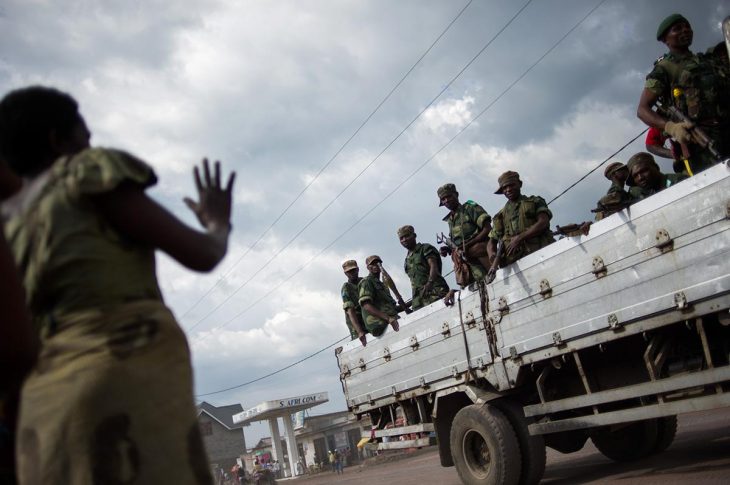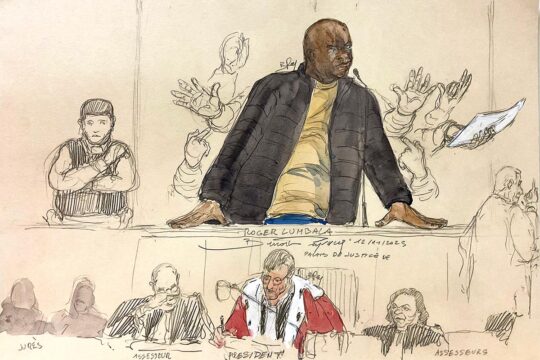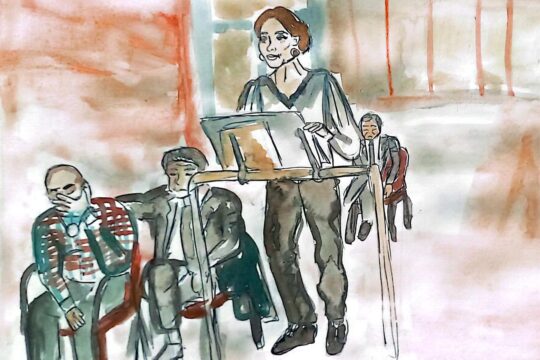"Deprived of everything, traumatized and humiliated, they live in misery and poverty, receiving no assistance either from individuals or from the Congolese government." This is how Léonard Basilwango Mutumoyi, Senior Coordinator of the African Centre for Peace, Democracy and Human Rights (ACPD), describes the situation of the "seven victims of Mulenge" as they are dubbed by the justice and human rights community in the Democratic Republic of Congo (DRC).
These women, one of whom is blind, were raped in Mulenge, South Kivu province, one day in August 2009 by men paid to ensure their safety: elements of the regular Congolese army. In 2010, five soldiers were convicted of crimes against humanity for these rapes and sentenced to prison terms. The military court also ordered the Congolese state to pay the sum of US$50,000 to each of the victims. The judgment was confirmed on appeal on November 7, 2011.
But nearly a decade later, not a single dollar has been paid. And the seven women of Mulenge are far from the only ones in this situation in this vast country where mass crimes are the almost daily fate of defenceless civilians.
28 million dollars for 3,300 victims
Congolese courts, mainly military, have tried more than 50 cases of war crimes and crimes against humanity between 2005 and 2020, pronouncing a large number of convictions and damages for victims, says a joint report published in mid-October by Avocats Sans Frontières (ASF), TRIAL International and RCN Justice & Democracy, According to the data collected by these three organizations, the Congolese justice system has, in total, ordered the payment of nearly US$28 million in damages to more than 3,300 victims. Reparations were not only ordered from the accused, but also from the Congolese state in solidarity.
"To date, only one reparation order seems to have been executed," say the three international organizations, which closely follow Congolese judicial proceedings relating to mass crimes. This so-called "Songo Mboyo case" is the exception that proves the rule. It concerns seven members of the regular army sentenced in 2006, jointly with the Congolese state, to the payment of US$165,317 in damages to 33 civilian parties. These soldiers were tried for crimes against humanity and war crimes committed in a village in Equateur Province in 2003.
According to the three NGOs, the reparations were disbursed in two instalments in 2015 and 2018, more than ten years after the decision. It was a real obstacle course. In addition to these delays, these organizations note that the implementation has encountered significant dysfunctions, including opacity in the distribution of funds to victims, discriminatory practices and misappropriation of part of the funds by state agents and intermediaries. "This execution was, it seems, made possible by the intervention of the Minister of Gender at the time, normally not involved in such a procedure," the authors point out.
“Halfway justice”
"For the victims, imprisoning perpetrators means nothing until there is reparation. It is only halfway justice," says Congolese lawyer Charles Cubaka Cicura of the Bukavu bar, who has represented civil parties in several such cases in eastern DRC, a prime scene of mass crimes.
The reparation procedure is "very expensive for the victims, with many kinds of costs: legal, procedural, mailing costs, percentage fees, etc., to which are added the fees of the lawyers in charge of following up the case. In the aforementioned Mulenge case, the costs related to the procedure amounted to US$8,000, a sum that only organizations supporting victims can pay", according to the three human rights organizations, which describe "a considerable number of steps and interlocutors in jurisdictions and administrations that are severely hampered by administrative slowness and corrupt practices".
No reparation without corruption
"Many victims are in a fragile situation and therefore do not manage to initiate the enforcement procedure due to a lack of means. In order to carry out such a procedure, you need to contact a lawyer and pay fees. But these victims do not have the possibility of paying a lawyer," says Sylvestre Bisimwa, another Congolese lawyer who has represented civil parties in several cases. Not to mention, according to him, "the remoteness of the institutions involved in the execution of reparations granted to victims. The Ministries of Justice and Finance are located in the capital, Kinshasa, more than two hours by plane from the two Kivus, which account for most of these victims.
“The Congolese administration is plagued by corruption," continues Bisimwa. “Since the victims do not have the means to corrupt, their files are somewhat abandoned and disregarded.” The lawyer cannot hide his outrage. "It is unacceptable that payment is not granted when the procedure is correct and fulfils all the required conditions. There is a contradiction between the political statements of the DRC, which claims to be a state governed by the rule of law, and the facts or reality," he says. His colleague Charles Cubaka Cicura agrees: "It is a paradox. If we are in a state governed by the rule of law, the state must preach by example, by executing the judgments handed down by its competent courts. But it does not do so. This is bad faith.”
Exempting indigent victims from procedural costs
In their conclusions, the three NGOs call for the immediate execution of the decisions pronounced, and recommend that the government put in place a transparent system to facilitate the execution of future decisions. They call on the Congolese legislature and government to reform the enforcement procedure to make reparations enforceable ex officio, with the designation of a single interlocutor for the handling of cases within the Ministry of Justice; to introduce into Congolese law the possibility of forced execution against the state; to bring national law into line with international standards for reparations measures; and to exempt indigent victims from all costs related to the enforcement procedure.
Contacted by Justice Info, the Congolese Ministry of Justice did not respond.







